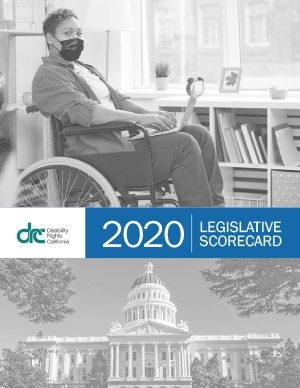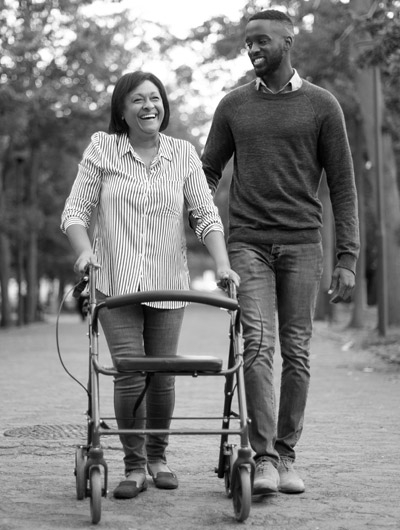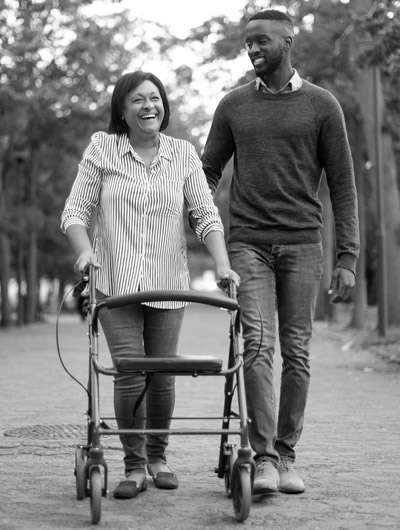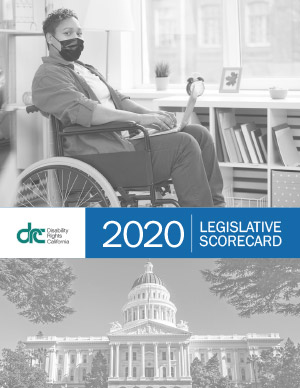2020 Legislative Scorecard

2020 Legislative Scorecard



This scorecard is designed to let you know where your California elected officials stand on a variety of issues critical to the disability community.

2020 LEGISLATIVE
SCORECARD
Introduction
Disability Rights California (DRC) is the largest disability rights organization in the nation. For more than 40 years we have fought against discrimination, promoted the inclusion of people with disabilities into communities of their choice, and advocated for the services and supports that they need. Legislative advocacy and ensuring that California’s policymakers are fully informed of these needs is critical to advancing the rights of persons with disabilities.
DRC advocates for persons with disabilities in the legislature on critical issues such as accessibility, education, physical and mental health, housing, transportation, public benefits, voting and the state budget. We serve as one of the leading voices on these issues in the legislature and bring with us the policy and advocacy experience of hundreds of DRC lawyers and advocates working in every county in the state. Our collective knowledge and representation of clients in facilities and institutions, state and local agencies and courts informs our legislative advocacy work and brings real and practical experiences to bear on significant policy issues. Each year DRC sponsors legislation and analyzes and advocates on hundreds of bills that impact the lives of persons with disabilities.
This year the COVID-19 pandemic radically changed our lives. It also dramatically changed the work of the Legislature and the Executive Branch for the 2020 legislative year. The Legislature was forced to take several extended recesses and its work was primarily done remotely. Legislative priorities were shifted, the number of introduced bills was significantly reduced, hearings on bills and the budget were abbreviated, and the budget was developed under a cloud of the pandemic-caused deficits. Many of the DRC-sponsored and supported bills and budget proposals did not move forward for these reasons.
Nevertheless, we believe that it is important that people with disabilities and the public know where their elected officials stand on legislation critical to the disability community during this challenging time.
The 2020 Legislative Scorecard

The bills included in the scorecard represent a cross-section of policy areas and includes some of the DRC sponsored and supported bills. We entered the legislative year sponsoring twelve bills. All but one was held in committees due to the pandemic and one made it to the Governor and was signed (SB 214 (Dodd)). We hope to bring some of those bills back in the upcoming legislative session. Otherwise, the scorecard bills reflect important policies impacting persons with disabilities and recognize the recent demands caused by the pandemic, the economic downturn, and social unrest around racial injustice.
While not scored in the scorecard this year, one of the major issues impacting persons with disabilities was the Governor’s proposed May Revision to the budget that included massive cuts to, and elimination of, crucial home and community-based services, health services and program supports. The May Revision proposed eliminating the Community-Based Adults Services (CBAS) program, the Multi-purpose Senior Services (MSSP) program, optional Medi-Cal benefits, the Medi-Cal eligibility expansion for Aged, Blind and Disabled adults, the augmentation to the Senior Nutrition program and Caregiver Resource Centers, and Aging and Disability Resource Centers. The partial reductions also included reducing funding for Independent Living Centers, the Ombudsman program, In-Home Supportive Services (IHSS), and the Supplemental Security Income/State Supplementary Payment (SSI/SSP) cost-of-living adjustment. All told, the reductions totaled over an estimated 2.3 billion dollars. The cuts were effective unless Congress appropriated additional funds to the states, the so-called trigger.
In a bold bipartisan stand, the legislative leadership, budget committees and legislators rejected the proposed May Revision reduction proposals to these critical programs. The cuts and reductions were not made and were not tied to any trigger conditioned on federal COVID funding. While not scored here, this was one of the most significant victories in the legislative year for persons with disabilities. We commend the Legislature for ensuring that the proposed budget reductions did not disproportionately impose more harm on the most vulnerable individuals who have borne the impact of the pandemic on their health and lives.
We hope that this scorecard will provide useful information to the public, legislators, and the Governor on the variety of disability-rights issues and DRC’s advocacy position on them. It is designed to serve as both an educational tool for the public to provide feedback to the state’s policymakers and for those policymakers to use as they develop their positions.
Scorecard Methodology
The bills included in the scorecard are some of the most important to the disability community that emerged from the legislative process in critical policy areas such as criminal justice, public benefits, budget, housing, health and mental health, voting and criminal justice. The scorecard compares member votes to DRC positions, creating an overall ranking of legislators based on those votes. Our scorecard methodology:
- Considers the percentage of votes cast on floor votes in the second house and on concurrence (if required) consistent with DRC’s position each time the member voted; and
- Ignores a legislator’s failure to vote on a bill attributable to an excused absence, as verified in the Daily Journal. We count a failure to vote, where there was no excused absence, as a vote against the DRC position.
We believe this methodology provides a useful record of which legislators supported DRC positions on issues critical to the unique rights and needs of people with disabilities.

Looking Forward
The pandemic has highlighted structural problems in our healthcare, housing, and justice systems that have led to disproportionate harm to California’s Black, Latino, Native American, and Asian Pacific Islander communities. DRC is committed to addressing systemic racism, ableism, homophobia, sexism, and structural barriers that deny us equal access to services, systems, and legal protections that all people deserve and require. Moving forward in this moment, DRC will be proactive in ensuring that our advocacy seeks out and responds to the voices of people of color with disabilities and members of the LGBTQIA2S+ community with disabilities. We will work toward addressing:
- Unsafe, segregated, institutional care for older adults and disabled people;
- High rates of unemployment and underemployment among people with disabilities;
- Long standing inequities in healthcare, mental health services, housing and education for disabled people, especially those who are part of the Black, Latino, Native American, Asian Pacific Islander, immigrant, and LGBTQIA2S+ communities;
- Government programs and private businesses that discriminate against disabled people and refuse to ensure physical and communication accessibility for all;
- A lack of affordable, accessible, healthy, and stable housing that is integrated into all communities; and
- An underpaid direct support workforce, a digital divide, and a growing wealth gap.
DRC will hold itself accountable for bold, progressive advocacy that pushes society toward more inclusion, equality and full participation for all people and push for equal opportunities, physical and communication access in housing, physical and mental healthcare, education, voting, and employment for ALL people with disabilities.





